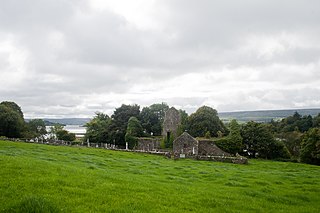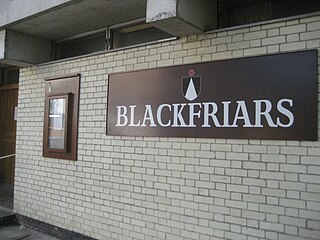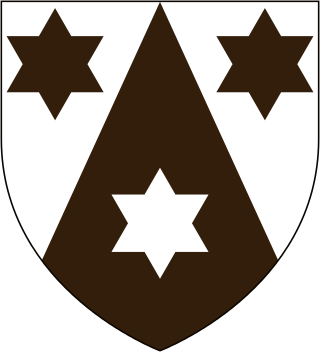Related Research Articles

Sligo Abbey was a Dominican convent in Sligo, Ireland, founded in 1253. It was built in the Romanesque style with some later additions and alterations. Extensive ruins remain, mainly of the church and the cloister.

Blackfriars is a restored Grade I listed 13th-century friary in Newcastle upon Tyne, Tyne and Wear, England, located in the city centre, close to the city's Chinatown.

Carlisle Cathedral is a Grade I listed Anglican cathedral in the city of Carlisle, Cumbria, England. It was founded as an Augustinian priory and became a cathedral in 1133. It is also the seat of the Bishop of Carlisle.

Ballindoon Friary was a Dominican priory beside Lough Arrow in County Sligo, Ireland. It was dedicated to St. Mary and founded in 1507 by Thomas O'Farrell. It was dissolved c. 1585 and is now in ruins.
The Church of the Friars Preachers of the Annunciation of the Blessed Virgin Mary at Wigtown, commonly called Blackfriars, was a mendicant friary of the Dominican Order founded in the 13th century at Wigtown, Galloway, Scotland. The Chronica Extracta said that it was founded by Dervorguilla of Galloway, who died in 1290.
Dunstable Friary was a Dominican friary in Dunstable, Bedfordshire, England. It was located to the west of Watling Street, between the present-day High Street South and the road that is called Friary Field.

Blackfriars, Bristol was a Dominican priory in Broadmead, Bristol, England. It was founded by Maurice de Gaunt in 1227 or 1228. Llywelyn ap Dafydd, son of Dafydd ap Gruffydd, the last native Prince of Wales, was buried in the cemetery of the priory. Following the Dissolution of the Monasteries in the 16th century, surviving parts of the priory became a guildhall for the Smiths and Cutlers Company, the Bakers Company, a workhouse and then a meeting house for the Quakers. In the 20th century, it has housed the local register office, a theatre company, and a restaurant.

Cambridge Blackfriars is a priory of the Dominican Order in Cambridgeshire, England. It was established in 1238, dissolved in 1538 and re-established in 1938. It continues to operate as a Dominican priory and, in 2000, became the novitiate house of the English Province of the Order of Preachers.
Carlisle Franciscan Friary was a medieval monastic house in Cumbria, England.

Derby Black Friary, also known as Derby Dominican Priory, or Blackfriars, Derby, was a Dominican priory situated in the town of Derby, England. It was also named in different sources as a friary, monastery and convent, but was officially a priory as it was headed by a prior. The "Black" came from the colour of the mantles worn by the friars of the order.
Gillingham Friary was possibly a Dominican friary in the town of Gillingham, Dorset, England.

Whitefriars, also known as the White Friars or The College of Carmelites, Gloucester, England, was a Carmelite friary of which nothing now survives.
The Dominican Friary, Winchester, otherwise Winchester Blackfriars, was a priory of the Dominican Order in Winchester, Hampshire, England. It was founded between 1231 and 1234, one of the earliest Dominican foundations in England.

Boston Friary refers to any one of four friaries that existed in Boston, Lincolnshire, England.

Atherstone Priory was a priory in Atherstone Warwickshire, England.
Arundel Blackfriars, otherwise Dominican Priory, Arundel, was a friary of the Dominican Order in Arundel, West Sussex, England. The date of foundation was before 1253, when Saint Richard, bishop of Chichester, mentioned it in his will. The friary remained small and poor throughout its history. It was dissolved in 1538.

King's Langley Priory was a Dominican priory in Kings Langley, Hertfordshire, England. It was located adjacent to the Kings Langley Royal Palace, residence of the Plantagenet English kings.

Dalston Hall is a fortified country house at Dalston in Cumbria, England. It is a Grade II* listed building.
References
- ↑ Campbell, William H. (2018). The Landscape of Pastoral Care in 13th-Century England. Cambridge University Press. p. 67. ISBN 9781316510384.
- ↑ Jefferson, Samuel (1842). A guide to Carlisle. Samuel Jefferson.
- ↑ Wilson, J (1905). "The friaries: Carlisle, Penrith and Appleby". A History of the County of Cumberland. pp. 194–199. Retrieved 20 April 2022.
{{cite book}}:|website=ignored (help)CS1 maint: location missing publisher (link)
54°53′34″N2°56′10″W / 54.892825°N 2.936069°W